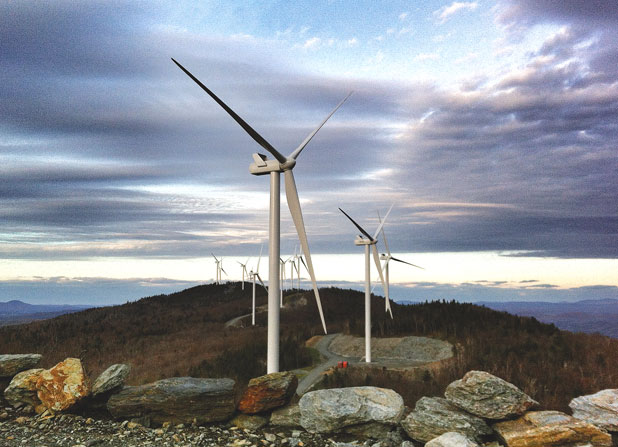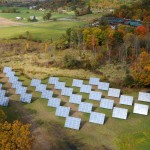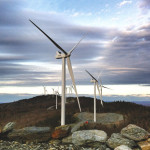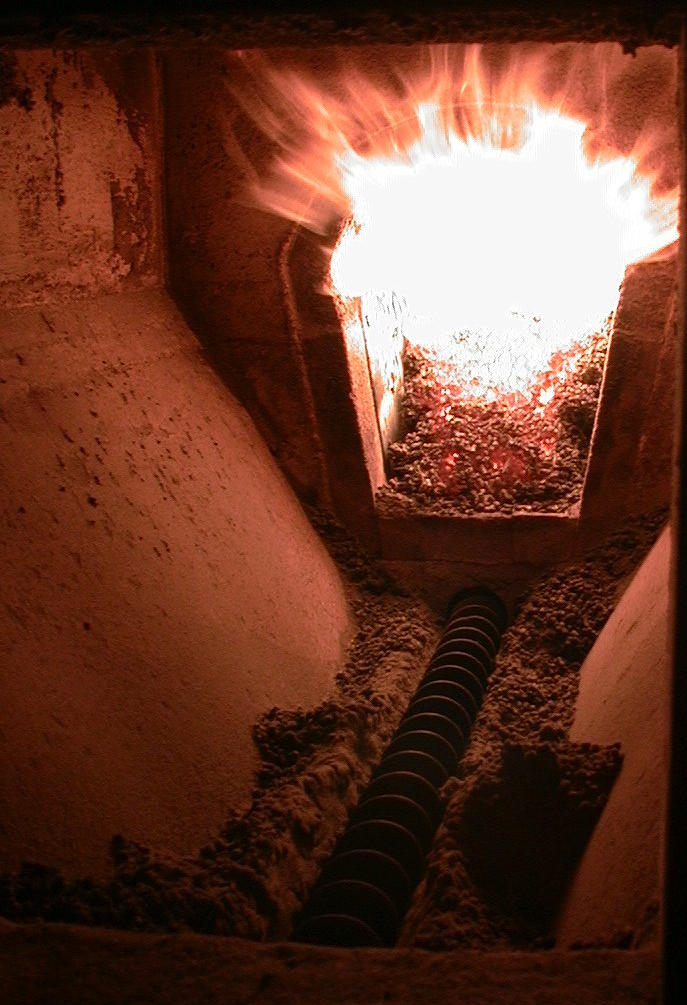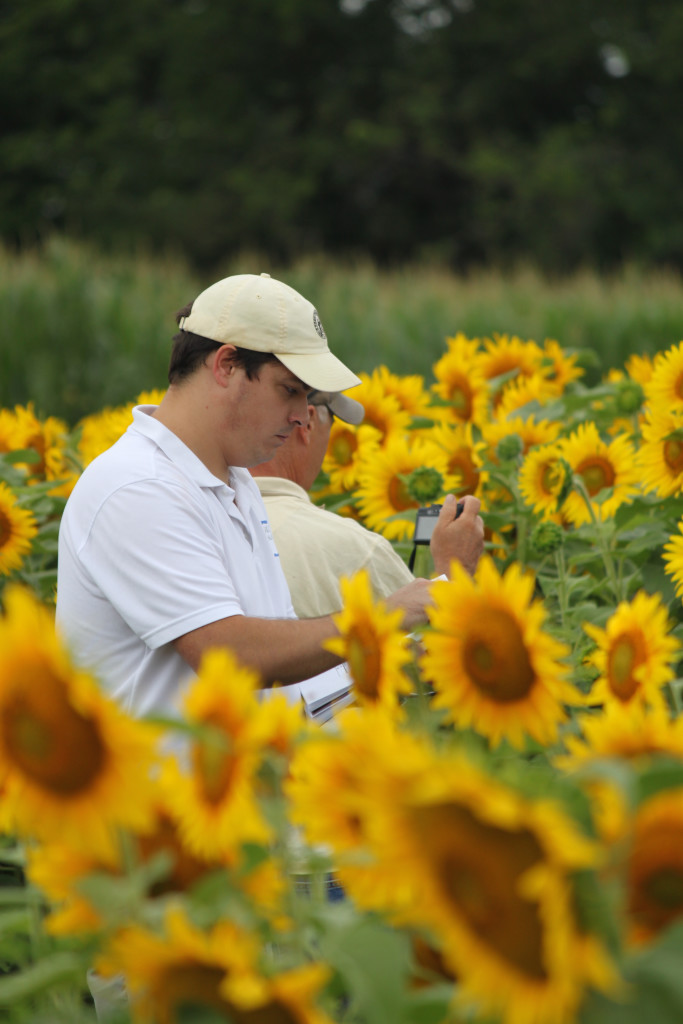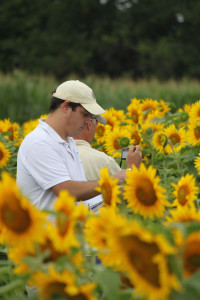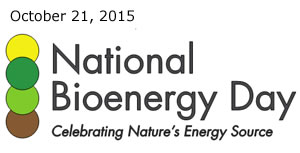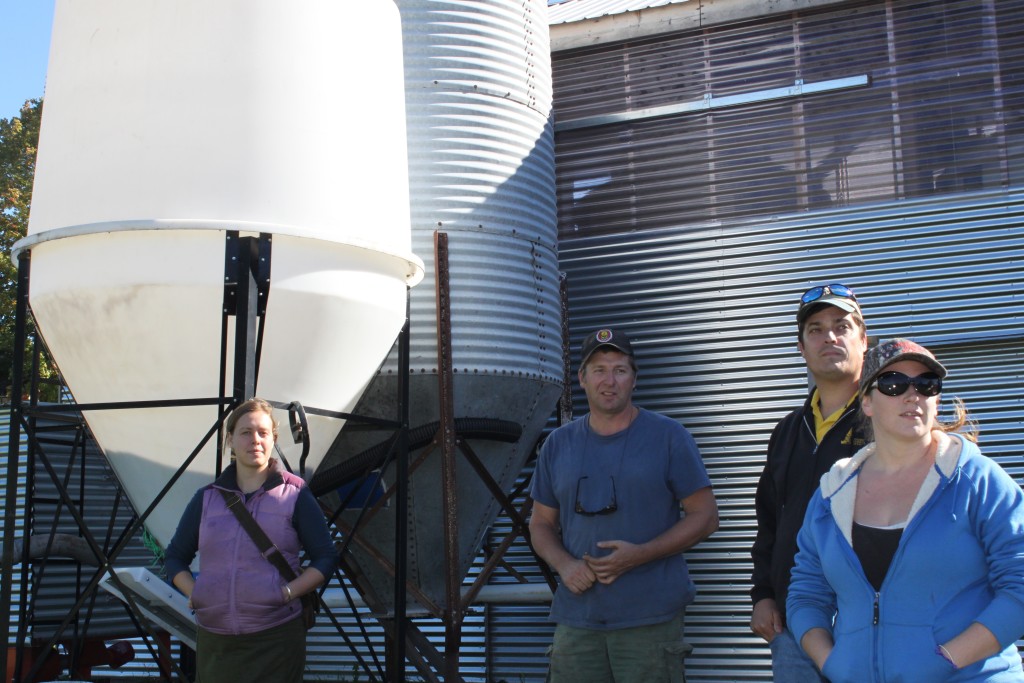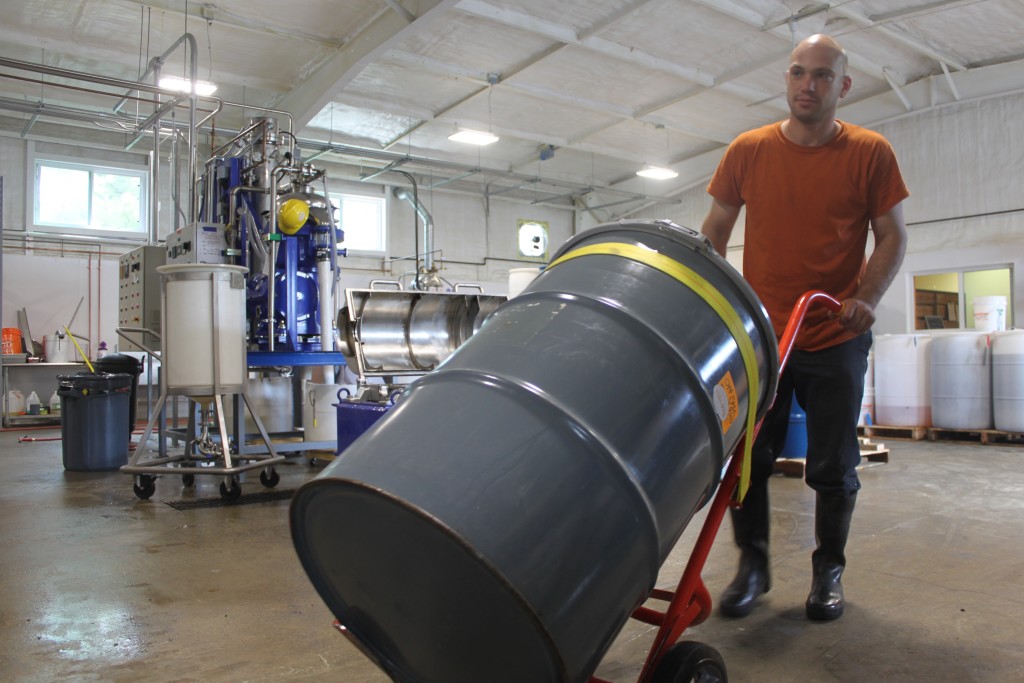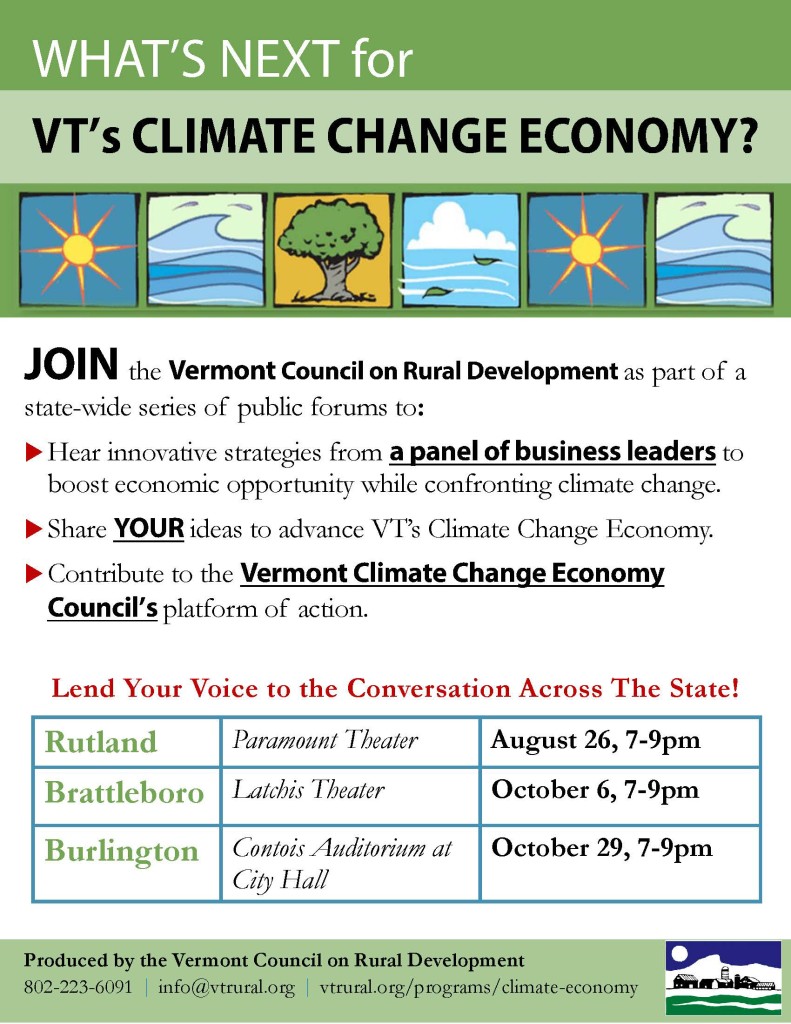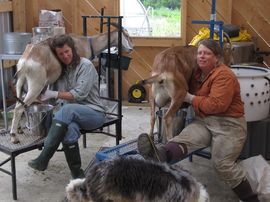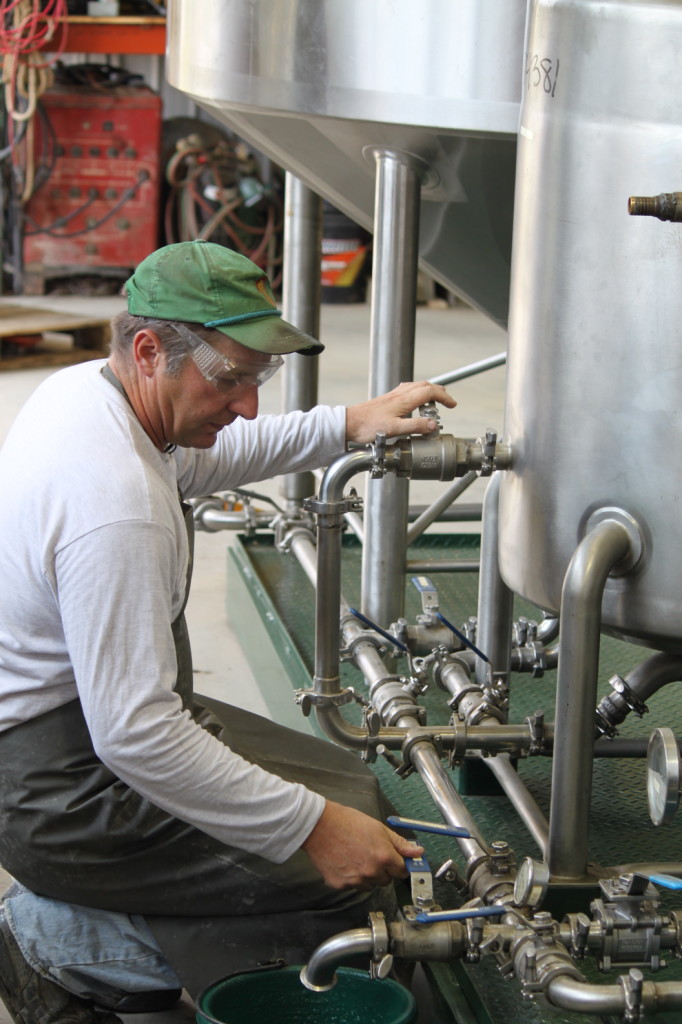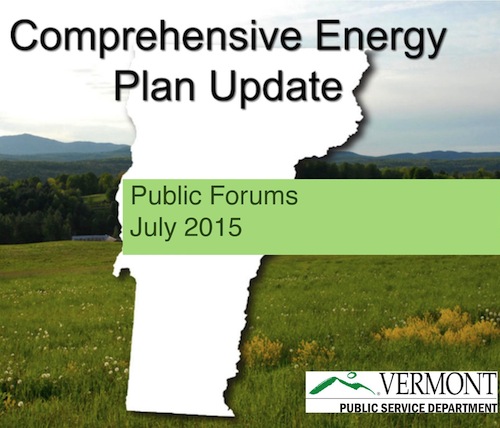07 Sep 2015
Weekly Energy Action Seminars at UVM
Beginning Monday the 14th of September, and reoccurring each week thereafter, an Energy Action Seminar Series aims to explore energy transitions in Vermont, the United States and the rest of the World. Sponsored by the University of Vermont’s Clean Energy Fund, Community Development & Applied Economic program, and the Environmental Program this series will be held from 4:00-05:20 pm in Lafayette Hall Room 108* at the University of Vermont. This series featuring world-class speakers on policy options, political controversy, costs and benefits, activism, and jobs is free and open to the public.
While there is already an extensive line-up of speakers, the most high profile speaker to stand out on the list is former Vice President Al Gore. Gore will draw on his years of climate advocacy for his discourse entitled “The Climate Crisis and The Case for Hope.” When delivering this discourse, Gore aims to address three big questions on the climate crisis: Do we need to change? Can we? And will we? The resounding answer to first two questions of course is a loud YES, but third one most likely cannot be answered in certain terms, and hopefully this where Gore can leave us all with “a case for hope.” NOTE: There is a slight deviation of schedule; this seminar will be on Tuesday, October 6th at 10:15 AM in Ira Allen Chapel.
In addition to Al Gore, numerous other leaders from near and afar will attend and speak during the duration of this series. One such visitor on September 21st, Professor Miranda Schreurs of Free University of Berlin and Director of their Environmental Policy Cente,r stands to bring a plethora of insight from her experience in Germany’s renewable energy revolution. In her time with the Environmental Policy Research Center, Professor Schreurs was on the frontlines of the interdisciplinary collaboration of university researchers necessary for Germany to meet it’s ambitious goal of running almost their entire economy on renewable energy by the year 2050. Germany’s goal is very similar to Vermont’s 2050 goal, and the potential for collaboration and to learn from one another through this event are boundless.
Another great guest speaker will come from Washington, all the way across the US,. Yoram Bauman, more commonly known “Stand-Up Economist,” uses a unique combination of witty comedic talent along with his PhD in Environmental Economics to help an audience explore climate change in an economic context. Yoram’s seminar exploring carbon taxing on October 10th will fall just a couple of days after he serves as the keynote speaker and sits on a carbon pricing panel at the 15th Annual Renewable Energy Conference & Expo in Burlignton, VT. His fresh and recent insight into Vermont’s existing carbon pricing discussion mixed with his existing expertise, and sense of humor will make this event worth not missing.
Additionally, many Vermont energy leaders will be speaking at theses weekly seminars including Representative Tony Klein Chair of House Energy and Natural Resources, Asa Hopkins Director of Planning for the Department of Public Service, Gabrielle Stebbins Director of Renewable Energy Vermont, and Mary Powell of Green Mountain Power. Each of these speakers, as well as the entities they represent, have proven themselves leaders in the Vermont energy landscape through their involvement in recent energy legislation, advocacy, and innovation.
| 9/14 | Energy Transitions | Jennie Stephens, Blittersdorf Professor of Sustainability Science & Policy, University of Vermont |
| 9/21 | Going Green: The German Energy Transition | Miranda Schreurs, Professor, Free University of Berlin Director, Environmental Policy Center |
| 9/28 | The Vermont Energy Transition | Tony Klein, Chair: House Energy and Natural Resources, Asa Hopkins, Director of Planning, Department of Public Service. Gabrielle Stebbins, Director, Renewable Energy Vermont |
| 10/5 | Student Alumni: Making a Difference in the World | Panel: Recent UVM grads in energy-related fields |
| 10/6* | The Climate Crisis and The Case for Hope | Al Gore, former Vice-President, United States |
| 10/12 | Carbon Taxes: Why We Need Them | Yoram Bauman, The world’s only “stand-up” Economist |
| 10/19 | Challenging the Car: Creating places where biking is safe & easy | Steve Clark, League of American Bicyclists, Community Organizer |
| 10/26 | Vermont’s Energy Company of the Future: A Customer Driven Energy Transformation | Mary Powell, President & CEO, Green Mountain Power |
| 11/2 | “The War on Coal:” Big Fossils’ Response to Divestment | Jen Schneider, Political Science Dept. Boise State University |
| 11/9 | The Transportation Transition: Complete Streets | Roger Millar, Director, SmartGrowth America |
| 11/16 | Energy Transitions in the Developing world: South Africa Settlements | Steve McCauley, Worcester Polytechnic Institute |
| 11/30 | Design Matters: Building Green | Rolf Keilman, Partner, Truex-Cullins, Vermont |
* Al Gore presentation is in the Ira Allen Chapel, special time, 10:15 a.m. Oct. 6
For more information contact
Fred Hall fhall@uvm.edu
Roison Low rlow@uvm.edu
Richard Watts rwatts@uvm.edu
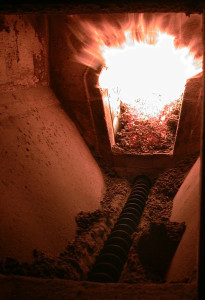 Efficiency Vermont, Renewable Energy Resource Center, Renewable Energy Vermont and Clean Energy Development Fund combine efforts to bring up to $5,500 in rebates to Vermonters who heat local
Efficiency Vermont, Renewable Energy Resource Center, Renewable Energy Vermont and Clean Energy Development Fund combine efforts to bring up to $5,500 in rebates to Vermonters who heat local
Through a generous opportunity, Vermonters now have a short-time frame before the new year to capitalize on a fantastic incentive offering that helps them save money, while supporting Vermont jobs and sustainable forests, while making sure they stay warm this winter.
Vermonters can get up to $5,500 to help switch from fossil fuel to local wood heating. Cash incentives are available from the Clean Energy Development Fund and Efficiency Vermont. Renewable Energy Vermont and the Renewable Energy Resource Center have partnered to help promote the incentives.
“We’ve been very happy with our decision to switch to a wood pellet boiler. Not only do we save money every year on our fuel bill, but we also love the fact that we’re helping to keep forests intact and logging jobs going,” says Mark Bushnell of Middlesex.
Vermonters who make the switch to wood pellet fuel typically save $1,500 annually when compared to oil and propane fuel heating options. And for those who are used to whole-home heating through their traditional boiler, the wood pellet boiler keeps it simple and complete. Advanced wood pellet boilers are fully automatic, so there’s no work for the home or business owner.
“I heated my home for years with a standard wood stove, but I’m happier with my wood pellet boiler. The new boiler is much more efficient and better for the environment because it is cleaner burning. And it feels great to be off fossil fuels,” says Susan Clark of Middlesex.
Wood pellet boilers, though not well known in the United States, are the primary way of heating in some parts of the world, including Upper Austria where more than 40,000 homes and businesses heat with wood from their background in an easy, seamless way. In fact, the State of Vermont and Upper Austria are involved in a Sister Statehood Agreement to help learning across both sides of the Atlantic to increase the uptake of this sustainable, local heating option.
“For many years, Vermont has been a national leader in the use of modern wood heating systems in large buildings like schools, office buildings, and apartment buildings. With pellets now available in bulk using specialized delivery trucks that conveniently blow pellets into a fuel bin and heating systems that are fully-automated, many homeowners and small businesses are also making the switch from oil and propane,” said Adam Sherman of the Biomass Energy Resource Center.
For more information, please go to www.advancedwoodheat.com
Media Contacts:
Renewable Energy Vermont, Ansley Bloomer, ansley@revermont.org (802) 595-0723
Biomass Energy Resource Center, Alayna Howard, ahoward@veic.org (802) 540-7656
Renewable Energy Resource Center, Alayna Howard, ahoward@veic.org (802) 540-7656
Efficiency Vermont, Alayna Howard, ahoward@veic.org (802) 540-7656
Clean Energy Development Fund, Andrew Perchlik, andrew.perchlik@state.vt.us (802) 828-4017
The Vermont Bioenergy Initiative connects diversified agriculture and local renewable energy production for on-farm and community use by supporting research, technical assistance, and infrastructure development in emerging areas of bioenergy including biodiesel production and distribution for heating and transportation, oil crops for on-farm biodiesel and feed, grass for heating, and algae production for biofuels and wastewater management. Explore the initiative’s extensive and accessible set of bioenergy resources for replication in rural communities across the United States and beyond.
Video
A series of informative educational showcase a range of biofuel possibilities; from research and crop farming to feedstocks and fuel. The videos were developed by the Vermont Sustainable Jobs Fund, UVM Extension researchers, KSE Partners, and the Vermont Bioenergy Initiative grantees.
Calculators
Two calculators, developed by UVM Extension, help connect potential costs and profits associated with oilseed production:
- Grass Biomass Production and Harvest Cost Estimator
- Vermont Oilseed Crop Production Cost and Profit Calculator
Course Work
- Biomass to Biofuels, University of Vermont: This semester-long course covers liquid and solid biofuels, biogas and bio-electricity, and environmental, social and economic issue related to biofuels. The course includes guest lecturers and field days. Available for variable credits.
- Biomass to Biofuels, Vermont Technical College: The development of this course and associated materials led to an online repository of resources for the classroom covering biomass to biofuels.
- Digester Operations Master Certificate, Vermont Technical College: a twelve week program designed for participants to work directly with operations staff of Vermont Tech’s anaerobic digester and come away with understanding of the mechanics and operations of a digester system, as well as other areas such as permitting, regulatory compliance and record keeping.
- Alternative Fuel Vehicles: Biodiesel, part of the Green Trainings series at Vermont Technical College: This 2-day course covers engine systems, biodiesel blends and biodiesel production, including a demonstration of fuel-making equipment.
- Biofuels Course at Yestermorrow Design/Build School, part of the Green Trainings series at Vermont Technical College: This weekend workshop enables students to begin replacing fossil fuels with biofuels, such as adapting engines to run on straight vegetable oil. 1 credit.
Textbook
Bioenergy: Biomass to Biofuels; is an innovative new textbook that provides insight into the potential and current advances and benefits of biofuel. Contributions include an extensive list of well-respected university extension programs, such as The University of Vermont Research Extension, as well as numerous national organizations including the US Department of Energy’s National Renewable Energy Laboratories.
Reports
A variety of reports are available which cover a range of topics including seed preparation and storage:
- Institute for Energy and the Environment at Vermont Law School.Legal & Regulatory Review of On-farm Biodiesel Production. 2015.
- Chris Callahan and Netaka White,Vermont On-Farm Oilseed Enterprises: Production Capacity and Break-even Economics. July 2013.
- Nell Campbell, Local Production for Local Use to Supply a Portion of Vermont’s Energy Needs.May 2009.
- Emily J. Stebbins. Technical and Economic Feasibility of Biodiesel Production in Vermont: Evidence From a Farm-Scale Study and a Commercial-Scale Simulation Analysis. May 2009.
- Christopher W. Callahan,A Feasibility Analysis of a Mobile Unit for Processing Oilseed Crops and Producing Biodiesel in Vermont. December 2008.
- Emily Stebbins, The Market Potential of Farm-Scale Oilseed Crop Products in Vermont. February 2008. (See also the Executive Summary)
- John Williamson & Tanner Williamson – State Line Biofuels, LLP, Chris Callahan – Callahan Engineering, PLLC, Feasibility Analysis:_Solar Seed Dryer and Storage Bin at State Line Farm, Bennington, VT. October 2008
- Christopher W. Callahan, A Feasibility Study of a Mobile Unit for Processing Oilseed Crops and Producing Biodiesel in Vermont. December 2008
- Kenneth Mulder, Ph.D., Galen Wilkerson, Emily J. Stebbins.Homegrown Fuel: Economic Feasibility of Commercial-Scale Biodiesel Production in Vermont. September 2007.
- The Vermont Biodiesel Project: Building Demand in the Biofuels Sector – Final Report. October 2006. (See also theExecutive Summary)
- Vermont Department of Buildings and General Services, Vermont Biodiesel Pilot Project: Emissions Testing of Biodiesel Blends With #6 Fuel Oil At the Waterbury State Office Complex – Final Report. September 2006.
- Laboratory and Field Testing of Biodiesel in Residential Space Heating Equipment – Final Report. August 2006.
- Vermont Biodiesel Supply Chain Survey – Final Report. April 2006.
- Wilson Engineering,Grass Energy in Vermont and the Northeast, May 2014.
Technical Advice
Connect directly with the Vermont Bioenergy Initiative’s technical assistance providers:
Oilseeds for Biofuel
- Heather Darby, Agronomic and Soils Specialist
- University of Vermont Extension, Northwest Crops and Soils Team
- (802) 524-6501
- darby@uvm.edu
- Chris Callahan, PE, Agricultural Engineer
- University of Vermont Extension
- (802) 773-3349
- callahan@uvm.edu
Grass for Heating Fuel
- Sidney Bosworth, Extension Professor
- University of Vermont College of Agriculture and Life Sciences
- (802) 656-0478
- bosworth@uvm.edu
Algae for Biodiesel
- Anju Dahiya, Instructor and Principal
- University of Vermont and GSR Solutions
- (802) 310-1936
- adahiya@uvm.edu
17 Aug 2015
The Third Annual National Bioenergy Day
The T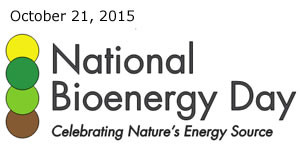 hird Annual National Bioenergy Day (NBD), which will take place Wednesday, October 21st, is a day that is marked with events from across the country that celebrates energy independence, local jobs, and many other benefits of local bioenergy. Led by Biomass Power Association in partnership with U.S. Forest Service, National Bioenergy Day is an opportunity for Vermonters to showcase our research, progress, and impacts in producing local bioenergy for local use.
hird Annual National Bioenergy Day (NBD), which will take place Wednesday, October 21st, is a day that is marked with events from across the country that celebrates energy independence, local jobs, and many other benefits of local bioenergy. Led by Biomass Power Association in partnership with U.S. Forest Service, National Bioenergy Day is an opportunity for Vermonters to showcase our research, progress, and impacts in producing local bioenergy for local use.
How To Get Involved:
- Organize an event on or near October 21ndthat showcases bioenergy as a clean, efficient, and resourceful way to produce energy. Emphasizes bioenergy’s role in improving environmental health; and facilitates collaboration along the supply chain.
- Partner with someone who works in the bioenergy supply chain to create an event. Use the Vermont Energy Atlas to find partners in your area.
- Piggyback on an existing event and call it a NBD event.
- Share and talk about NBD in your social media and press efforts while promoting impacts in your community.
The Vermont Bioenergy Initiative, for example, will spend the day re-capping and previewing events and research on our Twitter handle @VTBioenergy that took place throughout the summer and that are planned for the fall. We’ll be recapping and sharing exciting things like the exciting learning opportunities at the University of Vermont, Full Sun Company’s Biodiesel and Meal production, and much more!
For more information, you can visit also visit bioenergyday.com and follow @USAbiomass on twitter!
Click Here for National Bioenergy Day Participation Guide!
10 Aug 2015
Bioenergy Events 2015
The team 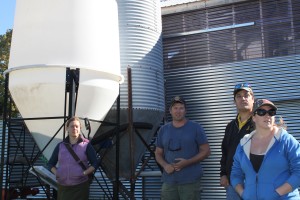 at Vermont Bioenergy Initiative has worked to put together a comprehensive list of bioenergy events for you! This list will be updated as more events arise. If you know a bioenergy events that you think should be on the list, tweet it to us! @VTbioenergy
at Vermont Bioenergy Initiative has worked to put together a comprehensive list of bioenergy events for you! This list will be updated as more events arise. If you know a bioenergy events that you think should be on the list, tweet it to us! @VTbioenergy
- September
- Modern Wood Pellet Heating Forum, Tuesday, Sep. 15, 2015, 6 – 8:30pm, Montshire Museum in Norwich, Vermont
- Ag Innovation Showcase September 14-16, 2015 St. Louis, MO
- 2nd International Conference on Past and Present Research Systems of Green Chemistry. September 14-16, 2015. Orlando, Florida
- Switchgrass III. September 30 to October 2, 2015. Knoxville, TN
- Algae Biomass Summit September 30-October 2, 2015 Washington, DC
- October
- Renewable Energy 2015 Conference & Expo. October 8-9 2015. Burlington, VT
- National Advanced Biofuels Conference & Expo. October 26 – 28, 2015. Omaha, Nebraska
- 2015 TAPPI PEERS Conference – Sustainable Solutions for Our Future. October 25-28, 2015 in Atlanta, Georgia.
- International Bioenergy and Bioproducts Conference 2015 – 10/28 – 10/30 Atlanta, United States
- 3rdAnnual National Bioenergy Day
- November
- April
In early 2014 Full Sun Company, a small start-up business was co-founded by Netaka White and Davis McManus. Fueled by an interest to help family farms grow, Full Sun began processing sunflower and non-GMO canola oil crops into specialty food-grade oil and high-protein meal for the farmers. Sunflower and canola oil distribution picked up quickly through local CSAs, farm stores, specialty food shops, health and wellness centers, and direct sales to chefs in the Northeast.
Netaka White previously served as the Vermont Bioenergy Initiative’s (VBI) program director, which directly helped to develop the business model to nurture farm partnerships, both as growers and recipients of oilseed meal – the other product that’s generated from making the oil. At Full Sun oilseeds are pressed with large mechanical machinery, producing oil and a granular meal. The team at Full Sun Company learned a lot about seed storage and oil pressing from the early VBI grantees, such as John Williamson of State Line Farm, and Roger Rainville of Borderview Farm.
The first of the two products, the seed meal, has been used as fuel for pellet stoves, or as is the case with Full Sun, sold as fertilizer for crops, or nutritional meal for livestock. At full operation, Full Sun can pump out one ton of meal per day – necessary to meet the growing demand of such customers as The Intervale in Burlington, Vermont and several local pig, poultry, dairy, and beef producers.
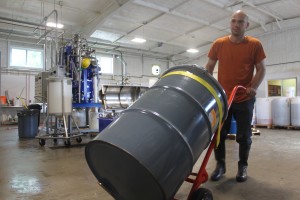
Full Sun Company employee, Zach Hartlyn, moves an off-spec oil barrel for biodiesel production
Credit: Full Sun Company
The second product, the oil, is used as culinary oil for cooking. Staying true to their commitment to an extraordinary culinary product, Full Sun Company diverts any of the oil that does not meet their standards to Vermont Bioenergy Initiative biofuel producers to undergo further processing and become biofuel. Approximately 250-300 gallons of off-spec oil for biodiesel has been processed since February, 2014.
In October, 2014, Full Sun Company halted operation to make room for growth to meet the increased demand for their products and scale up to align with Vermont’s accelerating agricultural economy. White and McManus acquired the former Vermont Soap building in Middlebury, Vermont in order to build a full scale mill and achieve their anticipated greater capacity. Over the course of one of the coldest winters in recent history, the Full Sun team made the renovations and adjustments needed to repurpose the building into the first non-GMO verified oil mill in New England. By March of 2015 Full Sun Company had pressed sunflower and canola seeds to make their first batch of specialty oils. The new operation can yield 130 gallons of oil per day – about 2600 gallons per month!
With no shortage of innovation or ambition, White notes, “David and I are in this with the interest of having a transformative effect on local agriculture and food systems.” Well on their way, the operation is certified GMO free, and the next steps are being taken towards becoming certified organic.
As they grow, Full Sun would like to buy from local grower-suppliers and work with local businesses to package and label feed to be distributed to farmers of varying sizes, from backyard chicken growers to larger operations. Collaborating with Vermont breweries and distilleries is also in queue. Full Sun is working with one local distillery to put together “a package” for farmers so they have markets for profitable grain crops throughout four years of rotation (rye, wheat, sunflowers, etc.) and can offer farmers the indexed prices for these locally grown grains and oilseeds.
27 Jul 2015
Summit on Creating Prosperity and Opportunity Confronting Climate Change – Looking Back and Looking Forward
 The Summit on Creating Prosperity and Opportunity Confronting Climate Change brought together over 400 innovative business, non‐profit, and community leaders, elected officials, public policy advocates, students, and interested residents to begin to frame policy and investment strategies to advance the development of the Vermont Climate Economy. Summit participants developed a list of key practical actions to serve as a launching point for the Vermont Climate Change Economy Council (VCCEC), a group charged with a one year mission to develop a structured plan with practical actions to reduce carbon emissions and stimulate green economic development in Vermont. The Council will build a set of public/private strategies designed to promote economic opportunity, innovative business development, investment, and job creation in Vermont.
The Summit on Creating Prosperity and Opportunity Confronting Climate Change brought together over 400 innovative business, non‐profit, and community leaders, elected officials, public policy advocates, students, and interested residents to begin to frame policy and investment strategies to advance the development of the Vermont Climate Economy. Summit participants developed a list of key practical actions to serve as a launching point for the Vermont Climate Change Economy Council (VCCEC), a group charged with a one year mission to develop a structured plan with practical actions to reduce carbon emissions and stimulate green economic development in Vermont. The Council will build a set of public/private strategies designed to promote economic opportunity, innovative business development, investment, and job creation in Vermont.
Over the course of 2015, VCCEC will evaluate findings, key ideas and suggested action steps derived from the Summit, lead regional public forums, evaluate and summarize research findings, interview key stakeholder groups, and consider model economic development strategies from other state and countries. During 2015, the group will develop a strategic platform of recommendations for action, and report to the Vermont legislature, the Governor of Vermont and the public in January 2016. The Vermont Council on Rural Development (VCRD) will provide support to their work and then help promote the platform of action that comes from its deliberants. Goals of the Vermont Climate Change Economy Council are to:
- Identify opportunities created by climate change to strengthen Vermont’s economy through strategies advancing key business clusters and economic sectors.
- Build an increased sense of unity in Vermont around policies to confront and mitigate the impact of climate change and to advance economic opportunities and solutions that respond to climate change.
- Build a public information campaign to celebrate innovation and Vermont’s green business leadership; internally and externally marketing to build the Vermont brand as an economic/environmental problem solver.
- Expand Vermont’s economic brand around climate change solutions to retain and attract youth and creative entrepreneurs to locate throughout the state.
Vermont businesses and nonprofits are addressing climate change – both its challenges and opportunities. Their creative solutions are a growing part of our state’s economy. What are your experiences? Do you have ideas about how Vermont can grow jobs and nurture innovative business development in sectors ranging from clean energy, to recycling, transportation systems, and thermal efficiency?
Jo![Regional_Forum_Flyer5_15_statewide[1]](http://vermontbioenergy.com/wp-content/uploads/2015/07/Regional_Forum_Flyer5_15_statewide1-150x150.jpg) in the Vermont Council on Rural Development and local business leaders at a forum on “What’s Next for Vermont’s Climate Change Economy?” Forums will take place at 7:00pm at the Paramount in Rutland (Aug 26), the Latchis Hotel in Brattleboro (Oct 6), and City Hall in Burlington (Oct 29). Come to the forum(s) most convenient for you.
in the Vermont Council on Rural Development and local business leaders at a forum on “What’s Next for Vermont’s Climate Change Economy?” Forums will take place at 7:00pm at the Paramount in Rutland (Aug 26), the Latchis Hotel in Brattleboro (Oct 6), and City Hall in Burlington (Oct 29). Come to the forum(s) most convenient for you.
These forums are the next step for public input to the Vermont Climate Change Economy Council, a group working to develop a practical plan to reduce carbon emissions and stimulate economic development in Vermont. To learn more about the forums and the Council visit VCRD’s website at vtrural.org, download the event flyer (pdf).
For more information about the results of the summit, Click HERE to read the report and follow the hashtag #VTClimateEconomy and Vermont Council on Rural Development on Twitter at @VTRuralDev for more updates!
Farms open their doors to a public interested in learning more about where food comes from and supporting the local agricultural economy
Farmers across Vermont will throw open their barn doors and garden gates to welcome the public for a behind-the-scenes look at Vermont’s vibrant working landscape. Vermont’s first Open Farm Week will be held Monday, August 3 – Sunday, August 9, 2015.
Open Farm Week is a weeklong celebration of Vermont farms. Over 100 farms are participating, many of whom are not usually open to the public. Open Farm Week offers Vermonters and visitors alike educational opportunities to learn more about local food origins, authentic agritourism experiences, and the chance to build relationships with local farmers. Activities vary and may include milking cows and goats, harvesting vegetables, collecting eggs, tasting farm fresh food, scavenger hunts, hayrides, farm dinners, and live music.
Visit DigInVT for a map of participating farms by region. Many events are free and costs vary depending on what activities are offered. Everyone is invited to join the #VTOpenFarm conversations on social media. All participating farms, geographic location, and offerings are at www.DigInVT.com.
Farmers’ markets will also be a part of the Open Farm Week celebration as organizers planned the event to coincide with National Farmers’ Market Week – also the first week of August.
The first Vermont Buy Local Market on the Statehouse Lawn will be held during Open Farm Week on Tuesday, August 4th from 10am-1pm. The Vermont Agency of Agriculture, Food and Markets is organizing the first Statehouse farmers’ market in collaboration with the Capital City Farmers’ Market and NOFA-VT.
Building off of the success of NOFA-VT’s 2014 Open CSA Farm Day, Open Farm Week is a collaborative statewide agritourism project organized by members of the Vermont Farm to Plate Network including Intervale Center, Vermont Farm Tours, Neighboring Food Co-op Association, Vermont Agency of Agriculture, Vermont Fresh Network, Vermont Department of Tourism, Shelburne Farms and Farm-based Education, NOFA-VT, and City Market. Open Farm Week helps Vermont reach its statewide Farm to Plate food system plan goals to increase farm profitability, local food availability, and consumption of Vermont food products.
Vermont Open Farm Week is made possible by the generous support of Premiere Sponsor: City Market/Onion River Coop as well as the Vermont Department of Tourism and Marketing; Vermont Agency of Agriculture, Food and Markets, Localvore Today and Woodchuck Hard Cider.
13 Jul 2015
Making Biofuel
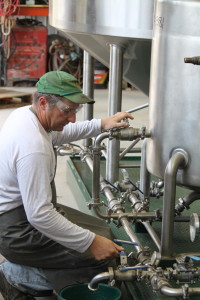 Making biofuel, it sounds like a complicated process taking place in a laboratory somewhere, but in reality it’s quite simple and happening in small, rural Vermont farms. Vermont farmers like John Williamson of State Line Farm and others are electing to create their own fuel and meal. These farmers are enjoying the benefits of the distance to source resiliency and cost reliability that comes with the local production for local use biofuel model they have adopted.
Making biofuel, it sounds like a complicated process taking place in a laboratory somewhere, but in reality it’s quite simple and happening in small, rural Vermont farms. Vermont farmers like John Williamson of State Line Farm and others are electing to create their own fuel and meal. These farmers are enjoying the benefits of the distance to source resiliency and cost reliability that comes with the local production for local use biofuel model they have adopted.
As John Williamson, a Vermont Bioenergy grant recipient says, “100 years ago everyone produced their own fuel; we are just doing that now in a different way.” This is a novel way to look at what he is doing on his North Bennington farm. Vermont farmers in the past would plan to allocate their acreage to feed their livestock, some of which aided in energy-intensive farm activities like plowing, planting, and the eventual harvesting of their field. With the local production for local use model, John is now thinking about how to feed his tractor so he can do the same activities. So what is the feed of choice for John’s John Deer tractor? Sunflowers!
John loads dry and clean sunflower seeds into hoppers on a TabyPressen Oilpress, where screw augers push the seed through a narrow dye. Extracted oil oozes from the side of the barrel and is collected in settling tanks while pelletized meal is pushed through the dye at the front and is stored in one-ton agricultural sacks. The first of the two byproducts, the seed meal, can fuel pellet stoves, serve as fertilizer for crops, or find its way to local Vermont farms to supplement animal nutrition as livestock feed. The second byproduct, the fuel, could at this point be used as culinary oil for cooking, but instead will experience further refinement and become biofuel.
The processing of the oil takes place in Johns self-designed Biobarn. In the below video, John Williamson and Chris Callahan of University of Vermont Extension show us how they can grow oil crops, make biodiesel, feed animals, and save money!
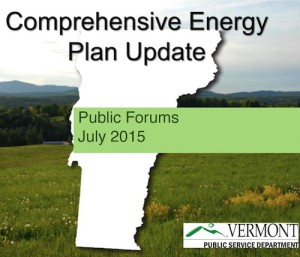 Have something to say about Vermont’s energy future? The Public Service Department (PSD) is seeking public input on its update to Vermont’s long-range Comprehensive Energy Plan. They want to hear Vermonters’ thoughts on how the state can meet its energy goals – and energy needs – in the coming years. They are holding four public forums in regions across the state in July at the following dates and locations;
Have something to say about Vermont’s energy future? The Public Service Department (PSD) is seeking public input on its update to Vermont’s long-range Comprehensive Energy Plan. They want to hear Vermonters’ thoughts on how the state can meet its energy goals – and energy needs – in the coming years. They are holding four public forums in regions across the state in July at the following dates and locations;
- July 9 – Woodstock (Billings Farm and Museum)
- July 16 – Middlebury (Town Hall Theater)
- July 20 – Manchester (Manchester Community Library)
- July 23 – St Albans (Bellows Free Library)
The comprehensive plan, which was last updated in 2011, will also incorporate some of the findings of the Total Energy Study, completed by the PSD last year. One of the PSD’s goals for the updated plan is to establish nearer-term targets that balance technology constraints, cost, carbon considerations and community concerns. The PSD will also host a series of forums, soliciting further public input, when a draft is available. These dates and times can be found below.
Public Hearings Schedule – All Hearings Run from 6 p.m.-8 p.m.
-
October 7 – Lyndonville
- Lyndon State College , Moore Community Room (campus map)
- From College Road, continue past Lower Campus Drive (it will be on your left) and continue straight through the four-way intersection, up the hill. Take the first left into the Vail parking lot. Enter doors at the end of the building; Moore Community Room is immediately to your left (#11 on the campus map).
- Lyndon State College , Moore Community Room (campus map)
-
October 13 – Essex
- Essex High School, Cafeteria (map)
-
October 21 – Montpelier
- Vermont College of Fine Arts (map), Noble Hall (campus map)
-
October 26 – Bellows Falls
- Bellows Falls Union High School, Auditorium (map)
-
October 29 – Rutland
- Rutland Regional Medical Center (map), CVPS/Leahy Community Health Education Center (location details)
Find more details or comment online here: http://www.energyplan.vt.gov




